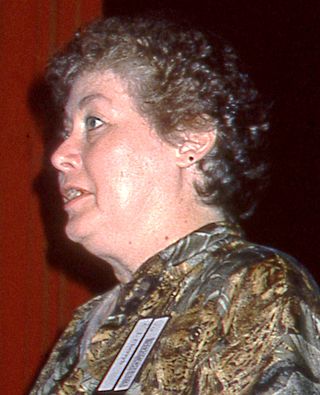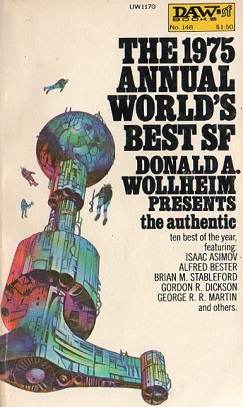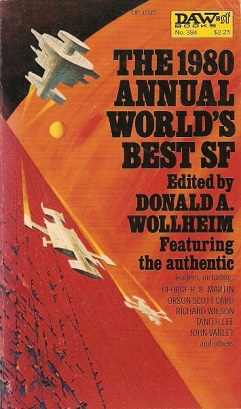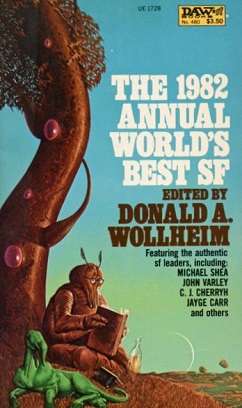Related Research Articles

Carolyn Janice Cherry, better known by the pen name C. J. Cherryh, is an American writer of speculative fiction. She has written more than 80 books since the mid-1970s, including the Hugo Award–winning novels Downbelow Station (1981) and Cyteen (1988), both set in her Alliance–Union universe, and her Foreigner series. She is known for worldbuilding, depicting fictional realms with great realism supported by vast research in history, language, psychology, and archeology.

Kate Wilhelm was an American author. She wrote novels and stories in the science fiction, mystery, and suspense genres, including the Hugo Award–winning Where Late the Sweet Birds Sang. Wilhelm established the Clarion Workshop along with her husband Damon Knight and writer Robin Scott Wilson.

DAW Books is an American science fiction and fantasy publisher, founded by Donald A. Wollheim, along with his wife, Elsie B. Wollheim, following his departure from Ace Books in 1971. The company claims to be "the first publishing company ever devoted exclusively to science fiction and fantasy." The first DAW Book published was the 1972 short story collection Spell of the Witch World by Andre Norton.
Lisa Goldstein is an American fantasy and science fiction writer whose work has been nominated for Nebula, Hugo, and World Fantasy Awards. Her 1982 novel The Red Magician won a National Book Award in the one-year category Original Paperback and was praised by Philip K. Dick shortly before his death. Her 2011 novel, The Uncertain Places, won the 2012 Mythopoeic Fantasy Award for Adult Literature, and her short story, "Paradise Is a Walled Garden," won the 2011 Sidewise Award for Best Short-Form Alternate History.

The Collected Short Fiction of C. J. Cherryh is a collection of science fiction and fantasy short stories, novelettes and novella written by American author C. J. Cherryh between 1977 and 2004. It was first published by DAW Books in 2004. This collection includes the contents of two previous Cherryh collections, Sunfall (1981) and Visible Light (1986), all of the stories from Glass and Amber (1987), stories originally published in other collections and magazines, and one story written specifically for this collection ("MasKs"). Cherryh's 1978 Hugo Award winning story, "Cassandra" is also included.

Heroes in Hell is a series of shared world fantasy books, within the genre Bangsian fantasy, created and edited by Janet Morris and written by her, Chris Morris, C. J. Cherryh and others. The first 12 books in the series were published by Baen Books between 1986 and 1989, and stories from the series include one Hugo Award winner and Nebula nominee, as well as one other Nebula Award nominee. The series was resurrected in 2011 by Janet Morris with the thirteenth book and eighth anthology in the series, Lawyers in Hell, followed by eight more anthologies and four novels between 2012 and 2022.

American writer C. J. Cherryh's career began with publication of her first books in 1976, Gate of Ivrel and Brothers of Earth. She has been a prolific science fiction and fantasy author since then, publishing over 80 novels, short-story compilations, with continuing production as her blog attests. Cherryh has received the Hugo and Locus Awards for some of her novels.

The Cherryh Odyssey is a 2004 collection of essays by various academics, critics and authors about American Hugo Award-winning science fiction and fantasy author, C. J. Cherryh. It was edited by author and academic, Edward Carmien, and was published by Borgo Press, an imprint of Wildside Press as part of its Author Study series. Locus Magazine put the book on its "2004 Recommended Reading List", and Carmien received a nomination for the 2005 Locus Award for Best Non-fiction book for The Cherryh Odyssey.

"The Scapegoat" is a science fiction novella by American writer C. J. Cherryh, set in her Alliance-Union universe. It deals with a war in which the two opposing species can not communicate with one another and do not know how to stop the conflict. The work was originally published in the 1985 anthology of military science fiction Alien Stars and was nominated for the Hugo Award for Best Novella.
The Merchanter novels are several loosely connected novels by science fiction and fantasy author C. J. Cherryh set in her Alliance-Union universe. These science fiction novels explore her merchanter subculture: the extended families that own and operate the ships that supply goods, transportation, news and trade to the various worlds and space stations in the human Earth, Alliance and Union space. The novels are related by a common setting and theme – a misfit who finds his or her proper home – rather than plot and character; none of the books is a direct sequel of another in the conventional sense.

The Ealdwood Stories, also known as the Arafel Stories, are a collection of fantasy works by American writer C. J. Cherryh. The books are works of high fantasy based in part on Celtic mythology. Arafel, a main character, is a Daoine Sidhe, the highest of the Sidhe faery-folk. She dwells in the magical small forest of Ealdwood, from which the tales take their name.
ElizaBeth Ann Gilligan was an American fantasy author who lived in San Francisco, California.

Aliette de Bodard is a French-American speculative fiction writer.

The 1975 Annual World's Best SF is an anthology of science fiction short stories edited by Donald A. Wollheim and Arthur W. Saha, the fourth volume in a series of nineteen.

The 1976 Annual World's Best SF is an anthology of science fiction short stories edited by Donald A. Wollheim and Arthur W. Saha, the fifth volume in a series of nineteen. It was first published in paperback by DAW Books in May 1976, followed by a hardcover edition issued in August of the same year by the same publisher as a selection of the Science Fiction Book Club. For the hardcover edition the original cover art of Jack Gaughan was replaced by a new cover painting by Chet Jezierski. The paperback edition was reissued by DAW in December 1981 under the variant title Wollheim's World's Best SF: Series Five, this time with cover art by Oliviero Berni. A British hardcover edition was published by Dennis Dobson in March 1979 under the variant title The World's Best SF 3.

The 1979 Annual World's Best SF is an anthology of science fiction short stories edited by Donald A. Wollheim and Arthur W. Saha, the eighth volume in a series of nineteen. It was first published in paperback by DAW Books in May 1979. It was reissued by DAW in 1984 under the variant title Wollheim's World's Best SF: Series Eight, this time with cover art by Olivero Berni.

The 1980 Annual World's Best SF is an anthology of science fiction short stories edited by Donald A. Wollheim and Arthur W. Saha, the ninth volume in a series of nineteen. It was first published in paperback by DAW Books in May 1980, followed by a hardcover edition issued in September of the same year by the same publisher as a selection of the Science Fiction Book Club. For the hardcover edition the original cover art of Jack Gaughan was replaced by a new cover painting by Gary Viskupik. The paperback edition was later reissued by DAW under the variant title Wollheim's World's Best SF: Series Nine.

The 1982 Annual World's Best SF is an anthology of science fiction short stories edited by Donald A. Wollheim and Arthur W. Saha, the eleventh volume in a series of nineteen. It was first published in paperback by DAW Books in May 1982, followed by a hardcover edition issued in September of the same year by the same publisher as a selection of the Science Fiction Book Club. For the hardcover edition the original cover art of Wayne D. Barlowe was replaced by a new cover painting by Dawn Wilson.

The 1986 Annual World's Best SF is an anthology of science fiction short stories edited by Donald A. Wollheim and Arthur W. Saha, the fourteenth volume in a series of nineteen. It was first published in paperback by DAW Books in June 1986, followed by a hardcover edition issued in August of the same year by the same publisher as a selection of the Science Fiction Book Club. For the hardcover edition the original cover art by Vincent Di Fate was replaced by a new cover painting by Ron Walotsky.

Nebula Winners Fourteen is an anthology of award winning science fiction short works edited by Frederik Pohl. It was first published in hardcover by Harper & Row in August 1980. The first British edition was published in hardcover by W. H. Allen in April 1981. Paperback editions followed from Star in the U.K. in March 1982 and Bantam Books in the U.S. in July 1982.
References
- ↑ "Cassandra". Internet Speculative Fiction Database . Retrieved February 25, 2018.
- 1 2 Cherryh, C. J. (2004). "Introduction" . The Collected Short Fiction of C. J. Cherryh . DAW Books. p. x. ISBN 0-7564-0217-4.
- ↑ "1979 Hugo Awards". Locus . Archived from the original on January 28, 2012. Retrieved January 26, 2012.
- ↑ "1979 Nebula Awards". Locus . Archived from the original on June 5, 2011. Retrieved January 26, 2012.
- ↑ "1979 Locus Awards". Locus . Archived from the original on April 13, 2015. Retrieved January 26, 2012.
- ↑ "1999 Locus All-Time Poll". Locus . Archived from the original on June 6, 2011. Retrieved January 26, 2012.